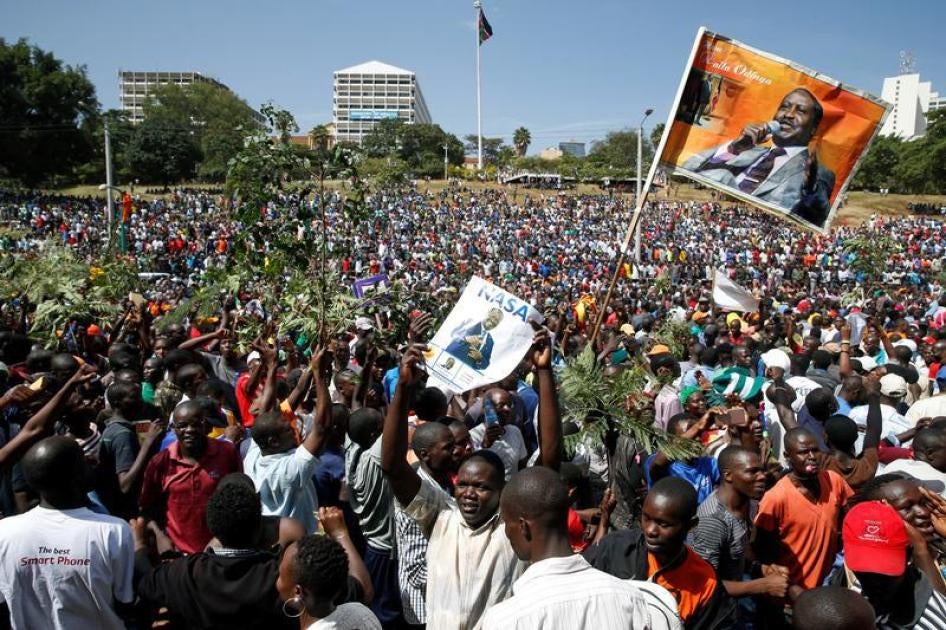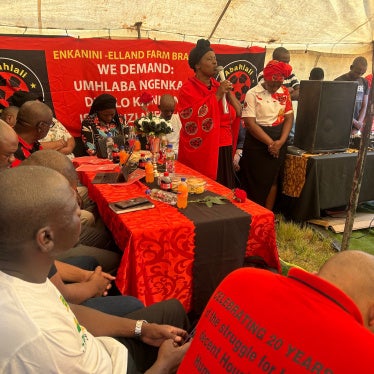(Nairobi) – Kenyan authorities stopped news outlets from covering a planned public event by a political opposition leader on January 30, 2018, Human Rights Watch said today. The Communications Authority of Kenya switched off three television stations and their affiliated radio stations. The television and radio stations were still off air at time of writing.
The authorities appear to have been angered by the decision of the media companies to defy President Uhuru Kenyatta’s order to editors at a meeting on January 26 not to cover the planned swearing in of the opposition leader, Raila Odinga, who rejected Kenyatta’s victory on October 26, 2017 in the presidential election. The Kenyan authorities have not given any explanation or legal justification for their attempt to ban media coverage of Odinga.
“Kenyan authorities have restricted media coverage at a critical moment, and violated the public’s right to information about important events,” said Otsieno Namwaya, Africa researcher at Human Rights Watch. “They should immediately allow the media organizations to resume their work in accordance with the law.”
On November 20, the Supreme Court upheld Kenyatta’s re-election as president, rejecting a petition from nongovernmental groups challenging his victory on October 26. The October 26 election followed a court order invalidating the first election, held on August 8, and ordering a new election within 60 days.
On January 29, the chairman of the Kenya Editors Guild, Linus Kaikai, issued a statement condemning the president’s decision to summon editors and senior media managers to the president’s office in State House on January 26. Kenyatta was accompanied at the meeting by his deputy, William Ruto, Interior Secretary Fred Matiang’i, Information Secretary Joseph Mucheru, and Attorney General Githu Muigai.
Kaikai said in the statement that at the meeting the president threatened to shut down any media organization that covered Odinga’s swearing in. The government has neither denied nor confirmed that it held the meeting on January 26, but at least one other official of Kenya Editors Guild and the chairman of the Media Owners Association have publicly said they attended the meeting with the president that Friday.
Waruru Wachira, the managing director of Royal Media Services, the parent company of Citizen TV and Radio, said on January 30 that there was no official communication from the government about why its stations were taken off the air. “We are actively engaging with the relevant government authorities to establish the reason for this action,” Waruru said in a statement to the media.
The government’s action underlines a trend since 2013, when Kenyatta took office for his first term. Government officials have intimidated, harassed and threatened media organizations and individual journalists and bloggers writing on sensitive subjects.
In some cases, journalists and bloggers critical of the government and senior officials have been physically attacked or killed, by people who have been identified. Suspects have rarely been arrested or convicted.
Pressure on the media increased during and after the prolonged election period in 2017, during which police cracked down violently on demonstrations by opposition supporters. On August 12, police arrested a Standard newspaper journalist, Duncan Khaemba, who was covering demonstrations in Nairobi’s Kibera neighborhood, for allegedly wearing a bulletproof vest without the necessary authorization, in what appeared to be an attempt to obstruct him from doing his work.
On January 6, David Mugonyi, Ruto’s spokesman, threatened to have a Daily Nation journalist, Justus Wanga, fired for a story that exposed a rift between Kenyatta and Ruto over the selection of the cabinet. “I want to be outright with you,” Mugonyi told Wanga in a 50-second call recorded by the Daily Nation. “If you want to be fired, continue on that path.”
A May 2017 Human Rights Watch and Article 19 report found that the authorities used a range of tactics, including harassment, intimidation, and threats, and withholding advertising and payment to media critical of the government, in an attempt to compel them to toe the line. Police have rarely investigated reports of attacks on journalists and bloggers, and attackers have rarely been held to account.
Kenyan authorities have an obligation to protect and uphold rights, including freedom of expression and the right to information, enshrined in the constitution and international law. Freedom of expression includes the right of everyone to receive and share information, through any media of their choice. States can only restrict this right when the restriction is based on a clear domestic law and is carried out for a legitimate reason as set out in international law, and if the restrictions are proportionate (i.e. not sweeping or with disproportionate punishments).
“Kenya is on a very slippery trajectory in regard to human rights, and president Kenyatta urgently needs to reverse this trend,” Namwaya said. “The heightened assault on freedom of the media and expression risks further damaging Kenya’s reputation in the world as a rights-respecting nation.”









